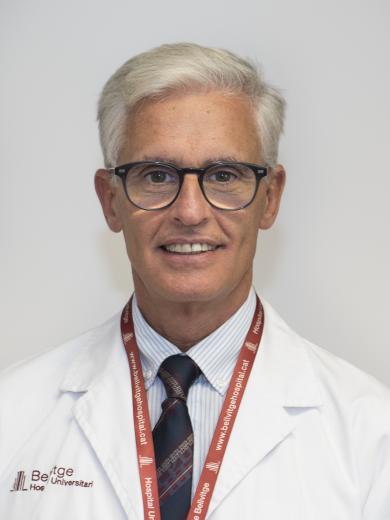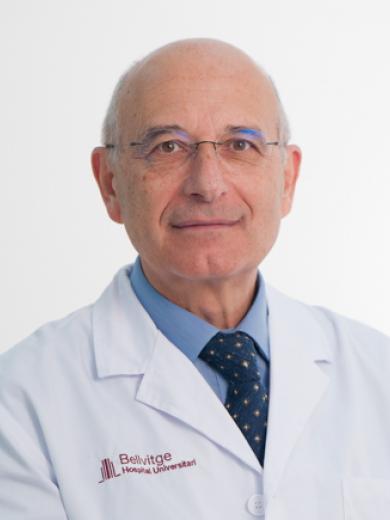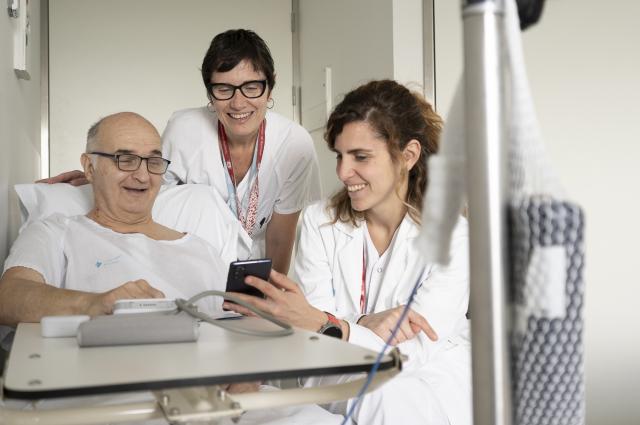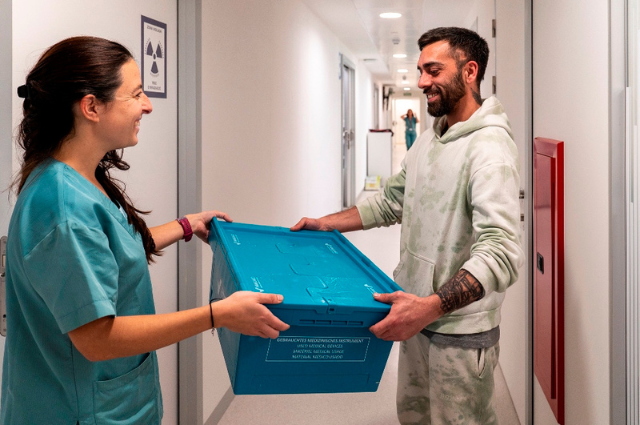
Within the Clinical Management of Heart Disease state-of-the-art clinical area that is patient-oriented and deals in the prevention, diagnosis and treatment of heart diseases, with healthcare evaluations and control that are in line with current scientific evidence, involving healthcare, education and research to the highest level of efficiency.
The healthcare given involves procedures in which the patient is the focal point of the process, developed along with the Cardiology and Cardiovascular Surgery Departments making up the Health Disease Area.
Around 200 professionals work in the Cardiology Department, including doctors, nurses, auxiliaries, administrative staff and orderlies, and is responsible for providing conventional cardiology care to a population of around 500,000 people, although the area of reference can reach between 1,300,000 and 2,500,000 people in certain programmes of significant specialisation and complexity (interventionist cardiology, cardiac transplantation, and mechanical ventricular assistance). The Hospital has the highest volume in the country in some extremely complex cardiology programmes (percutaneous coronary intervention, acute myocardial infarction angioplasty, or mechanical ventricular assistance).
The Integrated heart failure programme for the Southern Metropolitan Area of Barcelona has recently been established in which, along with the cardiology departments of the hospitals, professionals from other healthcare units (Internal medicine, Bellvitge Hospital A&E, primary care, etc.), processes, circuits and protocols will be agreed on for patients with heart failure throughout the area of influence.
Staff
Head of Service
Head of Service

Head of Section
Caps de Secció
Directors de programa
Head of Nursing Area
Cap d'Àrea Infermera
Managing Nurses
Infermers/res Gestors/es
Infermers/res Gestors/es
Nurse Managers
Infermers/res Gestors/es
Advanced practice nurses
Advanced practice nurses
Advanced practice nurses
Advanced practice nurses
Advanced practice nurses
Specialist Doctors
Facultatius/ves especialistes
Specialist Doctors
Facultatius/ves especialistes
Facultatius/ves especialistes
Specialist Doctors
Facultatius/ves especialistes

Facultatius/ves especialistes
Facultatius/ves especialistes
Facultatius/ves especialistes
Facultatius/ves especialistes
Facultatius/ves especialistes
Facultatius/ves especialistes
Specialist Doctors
Specialist Doctors
Facultatius/ves especialistes
Facultatius/ves especialistes
Specialist Doctors
Specialist Doctors
Facultatius/ves especialistes
Caps de Secció
Specialist Doctors
Specialist Doctors
Specialist Doctors
Specialist Doctors
Facultatius/ves especialistes
Specialist Doctors
Specialist Doctors
Specialist Doctors
Specialist Doctors
Specialist Doctors
Specialist Doctors
Specialist Doctors
Specialist Doctors
Specialist Doctors
Specialist Doctors
Specialist Doctors
Relevant aspects
Haemodynamics and Interventional Cardiology Unit
Diagnosis procedures:
- Coronariography.
- Right heart catheterisation: haemodynamic study of right heart cavities in relation to heart failure, heart transplants, or the study of pulmonary arterial hypertension.
- Combined right-left catheterisation, in the context of heart failure: myocardiopathy, pericardial pathology. Endomyocardial biopsy.
- Functional study of the coronary arteries: vasoreactivity test with acetylcholine.
- Functional study of the coronary arteries through the study of intracoronary flow using the Doppler technique.
- Functional study of coronary stenosis: FFR.
- Anatomical study of the coronary arteries: intravascular ultrasound (Boston and Volcano).
- Anatomical study of the coronary arteries:
- Optical Coherence Tomography (OCT, StJude and Terumo).
- Angiography to assess vascular access: aortoiliac axis, subclavian.
Procedure support:
- Percutaneous insertion of a transvenous pacemaker. Intraortic counterpulsation balloon pump implant. Impella 2.5 ventricular support system implant. The Impella CP system with a 4.0 L support has been in use since October 2014.
Therapeutic procedures:
- Coronary pathology:
- Coronary angioplasty with or without stent implant.
- Drug-coated balloon coronary angioplasty.
- Primary angioplasty for acute infarction.
- Coronary angioplasty with rotablation.
- Valvular pathology: Mitral valvuloplasty.
- Aortic valvuloplasty.
- Pulmonary valvuloplasty (scarce in our environment due to access from paediatric cardiology).
- Transcatheter pecutaneous aortic valve implant, CoreValveSystem® (transfemoral, trans-subclavian, direct aortic access).
- Angioplasty for pulmonary vein stenosis.
- Stent implant in pulmonary vein stenosis.
- Structural Pathology:
- Closure of interauricular defects (CIA) such as Ostium Secundum, using the Amplatzer® device.
- Closure of Patent Foramen Ovale (PFO) using the Amplatzer® device.
- Left auricular appendage closure to prevent stroke.
- Refractory hypertension treatment:
- Renal denervation using the Symplicity® system.
Others:
- Closure of coronary fistulae through Coil implantation.
- Closure of coronary-cavitary fistulae or other structures with the Amplatzer Cardiac Plug.
Electrophysiology and Arrhythmia Unit
- Special arrhythmia outpatient service.
- Specific genetic arrhythmia service (long QT syndrome, right ventricular arrhythmogenic dysplasia, Brugada syndrome, etc.).
- Syncope study (Holters of different kinds, tilt table test, electrophysiological studies).
- Primary sudden death prevention studies. Secondary sudden death prevention studies.
- Palpitation study (Holters, electrophysiological studies).
- Study and treatment of supraventricular tachycardia (including radiofrequency ablation).
- Study and treatment of atrial flutter (including radiofrequency ablation).
- Study and treatment of persistent or permanent paroxysmal atrial fibrillation (including radiofrequency ablation or cryoablation).
- Study and treatment of ventricular tachycardia (including radiofrequency ablation, or implantable defibrillators).
- Electrical cardioversion.
- Implanting and monitoring of all types of pacemaker.
- Implanting and monitoring of all types of implantable defibrillator.
- Implanting and monitoring of resynchronising devices to treat heart failure.
Non-Invasive Cardiology Unit
- Transthoracic echocardiography.
- Transesophageal echocardiography.
- Contrast echocardiography.
- Physical stress echocardiography.
- Pharmacological stress echocardiography: dobutamine and dipyridamole.
- Echocardiography, functional assessment.
- 3D transthoracic echocardiography.
- 3D transesophageal echocardiography.
- Monitoring of haemodynamic procedures: structural cardiomyopathy.
- TAVI, closure of septal defects, left auricular appendage closure, septal ablation in hypertrophic cardiomyopathy.
- Monitoring in electrophysiological unit procedures.
- Pre-operative echocardiography.
- Cardiac MRI.
- Morphological and functional study.
- Angiography CAT scan (coronary, heart and main vessels).
- Convention stress tests on treadmill.
- Perfusion gammagraphy (in collaboration with the Nuclear Medicine Department).
- Holter ECG monitor.
Heart Failure and Transplant Unit
Heart failure
- “De novo” systolic and diastolic HF diagnosis.
- Administering of intravenous diuretics, inotropes and iron at the Day Hospital.
- Assessment of patients with advanced HF and cardiogenic shock.
- Specific treatment of group 2 pulmonary arterial hypertension.
- Myocarditis protocol.
- Specialist consultation for genetic cardiomyopathies and hereditary cardiomyopathies.
- Specialist consultation with the Multidisciplinary Familial Amyloidosis Unit (MFAU).
- Cardiac rehabilitation and secondary prevention programme.
Heart transplantation
- Assessment and study of candidate patients.
- Post-operative control of transplant patients.
- Assessment of the degree of pulmonary arterial hypertension.
- Monitoring of post-HT complications: heart transplant rejection, infections, neoplasms and allograft vasculopathy.
- Implementation of different immunosuppression regimes.
- Treatment of cellular and humoral heart transplant rejection.
- Plasmapheresis.
- Immunoabsorption.
- Renal clearance treatments.
- Short-term mechanical ventricular assistance: ECMO, Centrimag-Levitronics and Impella. Medium/long-term mechanical ventricular assistance: BerlinHeart- Excor and Heartware-HVAD.
Other units
- Cardiovascular Intensive Care Unit.
- Cardiovascular Intermediate Care Unit.
- Post-Interventional Procedure Unit.
- Conventional Hospitalisation Unit.
- Integrated Heart Fault Programme for the Southern Metropolitan Area.
- Short Stay Unit - Day Hospital.
- Hospital and Out-of-Hospital Outpatient Services.
- Clinical Research Unit and Cardiovascular Research Lab
Healthcare procedures
- Acute coronary syndromes (including AMI with and without ST elevation).
- Heart failure and heart transplantation.
- Syncope and arrhythmias.
- Valvulopathies.
- Aortic pathology.
Research
Lines of research
- Interventionist Cardiology
- Heart Surgery:
- Heart Failure and Transplantation
- Cardiac Imaging:
- Cardiac Arrhythmias:
- Cardiovascular Research Lab
Main publications
- Luis Ferreiro J., Homs S., Berdejo J., Roura G., Gomez-Lara J., Romaguera R., Teruel L., Sanchez-Elvira G., Lucrecia Marcano A., Gomez-Hospital J Antoni, Angiolillo D.J., Cequier A. Clopidogrel pretreatment in primary percutaneous coronary intervention: Prevalence of high ontreatment platelet reactivity and impact on preprocedural patency of the infarct-related artery.Thrombosis and Haemostais. 2013 Jul;110(1):110-7
- Claver E., Cubero N., Cequier A. Diastolic Dysfunction With Nondilated Left Atrium. Chest.2013 Jan;143(1):272-3.
- Roura G.,Gomez-Lara J.,Ferreiro J.L., Gomez-Hospital J.A., Romaguera R., TeruelL.M., Carreno E.,Esplugas E., Alfonso F., Cequier A. Multislice CT for assessing in-stent dimensions after left main coronary artery stenting: a comparison with three dimensional intravascular ultrasound Heart. 2013 Aug;99(15):1106-12.
- Gomez-Lara J., Brugaletta S., Gomez-Hospital J.A., Luis Ferreiro J., Roura G., Romaguera R., Martin-Yuste V:, Masotti M., Iniguez A., Serra A., Hernandez-Antolin R., Mainar V., Valgimigli M., Tespili M., den Heijer P., Bethencourt A., Vazquez N., Serruys P., Sabate M., Cequier A. Everolimus-eluting stent versus bare metal stent in proximal left anterior descending STelevation myocardial infarction: Insights from the EXAMINATION trial. American Heart Journal. 2013 Jul;166(1):119-26.
- Ariza A., Luis Ferreiro J., Carlos Sanchez-Salado J., Lorente V., Antoni Gomez-Hospital J., Cequier A. Early Anticoagulation May Improve Preprocedural Patency of the Infarct-related Artery in Primary Percutaneous Coronary Intervention Revista Española de Cardiología. 2013 Feb;66(2):148-50.
Education
Degree education
- The Departmental professors provide education to 4th Year Medicine Graduates. (Subject: Cardiovascular System Diseases). Cardiovascular System Disease syllabus
- There is a 5-year Training Programme in the Cardiology Speciality: Total 15 Residents. Three Residents per year. Cardiology Residency Programme: First year: R1 Internal Medicine - 2 months Pneumology - 3 months Nephrology - 1 month Intensive Medicine - 3 months Emergencies - 3 months Second year: R2 Cardiology hospitalisation room - 8 months Coronary and Post-Coronary Unit - 4 months Third year: R3 Cardiac Imaging (MRI and ECG) - 6 months Coronary Unit - 4 months Heart Surgery - 1 months Stress tests - 1 month Outpatients - 1 day a week (1 month) Fourth year: R4 Haemodynamics, Interventionist Cardiology and coronary CAT - 6 months Arrhythmia Unit: - 4 months Paediatric Cardiology (Vall d’Hebron Children’s Hospital) - 2 months Outpatients - 1 day a week (2 months) Fifth year: R5 Cardiology hospitalisation room (own beds with supervision) – 4 months Optional or external rotation - 4 months Heart failure and Heart Transplantation Unit - 4 months Outpatients - 1 day a week (4 months) Duty shifts: A&E: first and second year. Cardiology and Coronary Unit: from the second to the fifth year. This is a Resident Rotation Programme for other specialities and for Cardiology that includes Residents from other Hospitals in Catalonia and the rest of Spain. These rotations are mostly made in the Cardiology Intensive Care Unit and the Advanced Heart Failure and Transplantation Unit.
Master's degrees and accredited courses
- Master’s degree in Coronary Disease
- Diagnosis and Interventionist Treatment.
- Part of the Master’s degree in Advanced Medical Skills at the University of Barcelona Specific, accredited fellowship programmes in the following sub-specialities
- Mechanical Ventricular Assistance Training Programmes Ongoing training activities:
- General or specific sessions aimed at medical and nursing staff, residents and fellows International Courses organised by the Department
Main Building Bellvitge University Hospital
c/ Feixa Llarga, sn. | 08907 L’Hospitalet de Llobregat. Barcelona
Floor 4 | Telephone number 93 260 76 86
AMCAsist@bellvitgehospital.cat

 Presentation
Presentation Staff
Staff Relevant aspects
Relevant aspects Research
Research Education
Education Location
Location News
News

